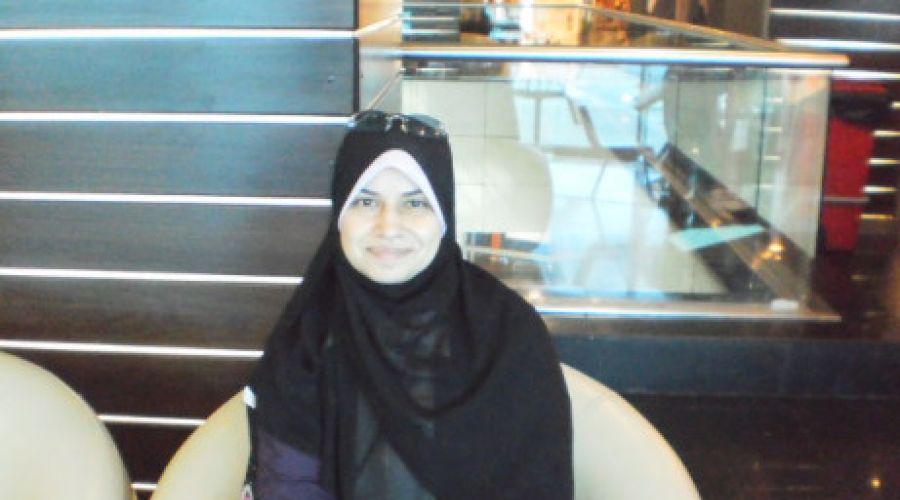At university I could not escape the shadow of war


When I first decided to apply for postgraduate scholarships in the United Kingdom, I felt like I was fighting the moving sands that were preparing to swallow my ambition and restrict me to the kind of life that is common for many women in traditional societies such as Gaza. Opposition to women travelling for cultural and religious reasons combine with the political context in Gaza made the idea of studying in the UK seem very remote and dream-like for Gazan women.
When you live in the shadow of bombardment and gunfire, your world shrinks and you focus solely on survival, on finding moments of peace. Your ambitions as an individual are overshadowed by the everyday collective struggle.
The continued isolation of Gaza – a 41km-long strip of Palestinian territory on the Mediterranean coast, whose airspace, maritime space and land crossings are controlled by Israel – makes the world seem distant, different and scary, and practical problems like power cuts and a lack of resources make it difficult to study and to apply to universities abroad.
To be accepted at Oxbridge, which has an exclusive mystique about it, felt impossible. But the availability of scholarships to the University of Oxford and support from family members encouraged me to apply and silenced the voice inside me that said I should not even dare to try.
Overcoming challenges
Several years on I now have a masters from the University of Oxford and a PhD from the University of Cambridge, so I am a Gazan and an alumnus of two elite universities. It is a wonderful feeling, but it has been an experience that has not come without challenges.
My masters at Oxford was my first time studying within a non-Arab educational system as well as my first time travelling alone. It was also the first time I had left Gaza in 14 years after my family returned from Kuwait in 1990. I focused on working very hard in order to succeed. After getting such an opportunity I could not risk failing. I spent long hours in the library reading.
When I saw other students socialising or partying, I used to whisper to myself: “They are different. They did not come from Gaza.” After Oxford, I returned to Gaza and worked at two of Gaza’s universities for five years.
When I started my PhD at Cambridge, I thought I wouldn’t face the same challenges as before, but I had not considered the detrimental impact living under siege had had on me.
Everything was beautiful in Cambridge, but I was not initially able to appreciate that beauty. I was imprisoned inside myself, in my memories of life under occupation in Gaza and burdened with an intense feeling of responsibility to learn so that I could return and contribute to Gaza’s future.
I made the effort to explore and socialise, to engage in the Cambridge community and benefit from the valuable opportunities on offer, but it was not easy – I was closed from the inside.
Although physically I was in Cambridge, psychologically I was still in Gaza. For example, any event where fireworks were present acted as a constant reminder of the sounds of bombardment in Gaza; the noise of planes hovering in the sky above Cambridge reminded me of the Israeli F-16 fighter jets. Relaxing and smiling seemed a guilty luxury to me.
At one event, I was asked what it was like living in a conflict zone. This question felt very strange. To me conflict was a fact of life. Indeed, I wondered how it felt to live in peace, and in peace every day. Life with no background of conflict seemed somehow more prosaic and overly normal.
It was hard to motivate myself, particularly in light of the fact that during my time at Cambridge there were two wars in Gaza and a coup in Egypt. These affected my research and prevented me from visiting home for five years. My father, an uncle and an aunt passed away during this time. They never got to know that I finished my doctorate successfully.
Reality gap
Despite living in a conflict zone and growing up in a traditional educational system in Gaza, I succeeded at both Oxford and Cambridge, achieving a distinction in my masters and passing my PhD viva with no corrections.
When I think of these achievements I wonder whether I was a genius, some sort of exception, an extraordinary Gazan female. The answer is no. I was just a woman of passion and faith who loved to learn, believed in her dreams and worked hard to pursue them. Did I succeed because of the support and opportunities offered by Oxford and Cambridge? I don’t think so.
The universities do make important efforts to offer facilities, services and activities to ensure a supportive, equal and diverse environment for their students generally. However, there is a gap between these efforts and the reality faced by students from conflict zones that requires attention.
Areas that need to be addressed by universities that want to be truly international and make things easier for students from conflict zones include:
- Ensuring that the admissions procedure takes into account things like power cuts and lack of resources and that there is psychological and professional support for students transitioning from a wartime to a peacetime context;
- Ensuring the admission procedures also considers possible delays in students from conflict areas taking up their places due to the ongoing conflict situation;
- Exploring whether students can be assisted to gain access to their home country for fieldwork and family visits and whether financial and logistical support can be offered for students to enable a short transitional period before they commence their PhD; and
- Providing counselling services and educating university staff in issues related to students from conflict areas.
Students like me not only have to deal with the culture shock that arises from the transition from one higher education system to another, but with the additional shock of having internalised conflict as the norm and of potentially being prevented for prolonged periods from visiting home and from receiving the support of – and offering support to – their loved ones.
My intention is not to undermine the experience of other international students, which also deserves attention. However, at a time of increased conflict around the world, universities face a serious challenge when it comes to equality and inclusion of students from conflict areas. World-leading universities like Oxford and Cambridge should strive to be pioneers and promote best practice in this area.
More support is needed for students from conflict zones so that they not only succeed, but also integrate into the communities where they study, contributing to the diversity of their higher education institutions and enriching their culture with counter narratives and distinct Southern perspectives. It is also important for the students who have struggled and persevered to be able to study abroad to find a home away from home.
Mona Jebril has just finished her PhD in education at the University of Cambridge, United Kingdom.
